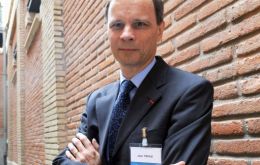MercoPress. South Atlantic News Agency
Tag: Paul Krugman
-
Friday, July 11th 2025 - 10:12 UTC
Nobel laureate claims Trump's tariffs on Brazil politically motivated

American Economist Paul Krugman, a New Keynesian expert who once received the Nobel Prize, has been heavily critical of President Donald Trump, saying that the Republican leader was “evil and megalomaniacal” after the 50% tariffs imposed on all Brazilian products and insisted the measure reverberated in his own country.
-
Thursday, September 12th 2019 - 09:55 UTC
Questions on the role of the IMF in the Argentine financial situation

Despite a history of many IMF rescue programs, Argentina once again faces a deepening financial crisis, raising questions about whether the Washington-based lender made a mistake in its dealings with Latin America's third largest economy.
-
Thursday, November 3rd 2016 - 10:20 UTC
Big Danger at the Lower Bound

By Kenneth Rogoff
Markets nowadays are fixated on how high the US Federal Reserve will raise interest rates in the next 12 months. This is dangerously shortsighted: the real concern ought to be how far it could cut rates in the next deep recession. Given that the Fed may struggle just to get its base interest rate up to 2% over the coming year, there will be very little room to cut if a recession hits. -
Tuesday, October 14th 2014 - 05:26 UTC
Economics Nobel Prize for work on dominating companies and market regulation

French economist Jean Tirole won the 2014 Nobel Prize for economics for his work that has shed light on how governments should regulate powerful companies that dominate markets, the Royal Swedish Academy of Sciences said on Monday.
-
Saturday, October 22nd 2011 - 11:02 UTC
The modern lords of finance are losing their immunity, says Paul Krugman

As the Occupy Wall Street movement continues to grow, the response from the movement’s targets has gradually changed: contemptuous dismissal has been replaced by whining. (A reader of my blog suggests that we start calling our ruling class the “kvetchocracy.”) The modern lords of finance look at the protesters and ask: Don’t they understand what we’ve done for the U.S. economy?
-
Monday, August 1st 2011 - 19:59 UTC
Nobel Prize Krugman criticized Obama for giving in on debt deal

The Nobel Prize winner economist Paul Krugman harshly criticized President Barack Obama for giving in to pressure compromising on a debt ceiling deal that defenders say will save the country from default.
-
Friday, June 24th 2011 - 20:15 UTC
Krugman: “when Argentina tried to act as a serious country, it was “a disaster”

Nobel Prize winner Paul Krugman took to his blog in the New York Times to say he didn’t see how Argentina’s default could be seen as a cautionary tale for Greece, and questioned a local economist who assured Argentina was not considered “a serious country.”
-
Friday, May 27th 2011 - 09:11 UTC
Top economists anticipate ‘restructuring’ of Greek debt or ‘booting’ out of the Euro

Nouriel Roubini, the New York University economist known as Dr Doom, says Greek restructuring would not bring down Europe's financial system. The economist, who earned his nickname by predicting the global financial crisis, says an orderly debt restructuring could pre-empt more trouble.
-
Wednesday, November 24th 2010 - 20:55 UTC
US on the path of Japan’s stagflation of 18 years ago, says Nobel Prize

Economics 2008 Nobel Prize Paul Krugman said the United States is heading along a path of stagnation and deflation similar to that of Japan 18 years ago given the critical economic situation and the uncertain political scenario following the recent mid term elections that brought to Congress diehard Republicans.
-
Saturday, June 26th 2010 - 05:16 UTC
“China playing games” with the announced Yuan flexibility, says Krugman

Nobel laureate Paul Krugman said China’s pledge to make the Yuan more flexible was an “exercise in bad faith” intended to fend off international pressure for a stronger currency at this week’s Group of 20 leaders’ summit.
